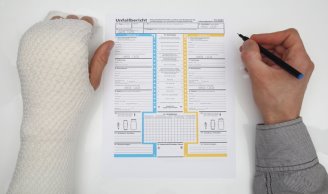Common Sense Tips for your Workers’ Compensation Claims
July 29, 2018 | Workers' compensation
Insurance companies watch out for their bottom line in administering your workers’ compensation claim. You should look out for yours. Delayed medical payments and wage loss benefits can damage your credit and create stress at a time you should be focused on healing. Following these simple tips can help you focus on your recovery and avoid some common issues.
- Restrictions
Give your doctors a good understanding of the work you did for your employer and ask if you’re able to work. If your doctor thinks you need time off of work, make sure that is written in the office note or in a separate note for your employer. If the doctor thinks you can work but have some restrictions, make sure those restrictions are clearly written out so your employer can see if they will be able to accommodate them. If your employer asks you to do work that is beyond the restrictions your doctor gave you for safe working, you are allowed to remind your employer of your restrictions and request duties that will not put you at risk of another injury. If your employer does not have work within your restrictions, they should pay you temporary total disability benefits (which are ⅔ of your average weekly wage each week you are off of work).
The bottom line is that your employer and the insurance carrier will go based on what the doctor writes down, so if the doctor believes you can’t work or that you need restrictions to work safely, make sure that it written down and signed by the doctor.
- Medical bills
Medical billing practices are extremely complex. Medical billing offices often make mistakes and fail to bill the service to workers’ compensation. That means they may not even send the bill to the claims adjuster and they expect you to pay.
First, make sure that each provider you see for a work-related injury understands that there is a workers’ compensation carrier and bills should be sent to that carrier. Take the insurance company information with you to your appointments and let the billing person know where the bills should be sent.
Second, if you do receive a bill, call the adjuster immediately to confirm the insurance company received the bill and paid it.. If the adjuster never got the bill, send it to him or her. Sometimes, especially with a surgery, there are bills from several places (the doctor, the facility, the anesthesiologist, etc.), and sometimes the adjuster has paid some but not all of the bills for that date of service. So it’s important to keep track of any bills you get and to make sure they are paid.
Third, providers are not allowed to charge you for the difference between what they billed and what workers’ compensation paid, so if you receive a bill for that difference, call the billing office and tell them that it is a workers’ compensation claim and you do not have to pay the balance.
The bottom line is that medical billing can be complex and bills are often missed by the carrier or by the medical billing office. Staying in contact with the adjuster and your providers’ billing offices will ensure timely payment of your bills and avoid missed bills that can be harmful to your credit.
To learn more about Workers’ Compensation Claims, please contact us at 402-933-3345.

Workers’ Compensation Claims

